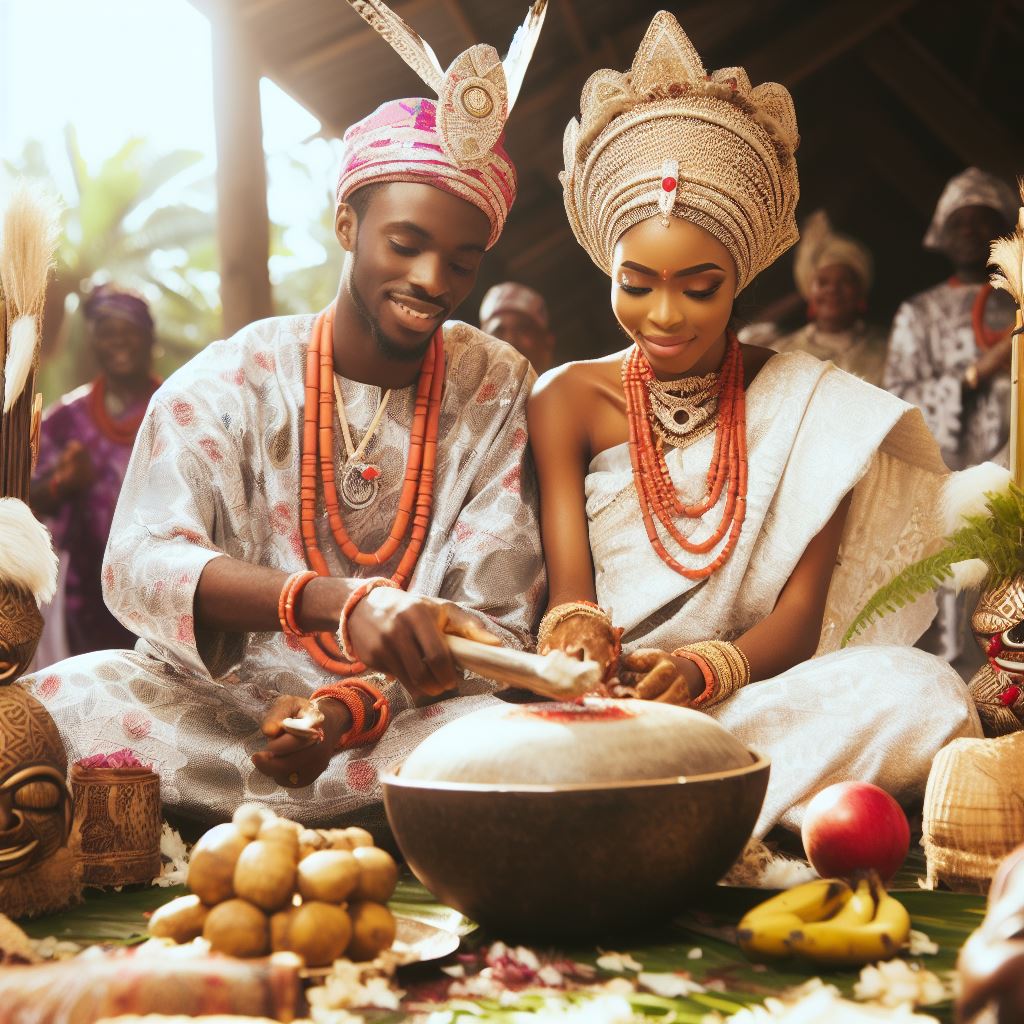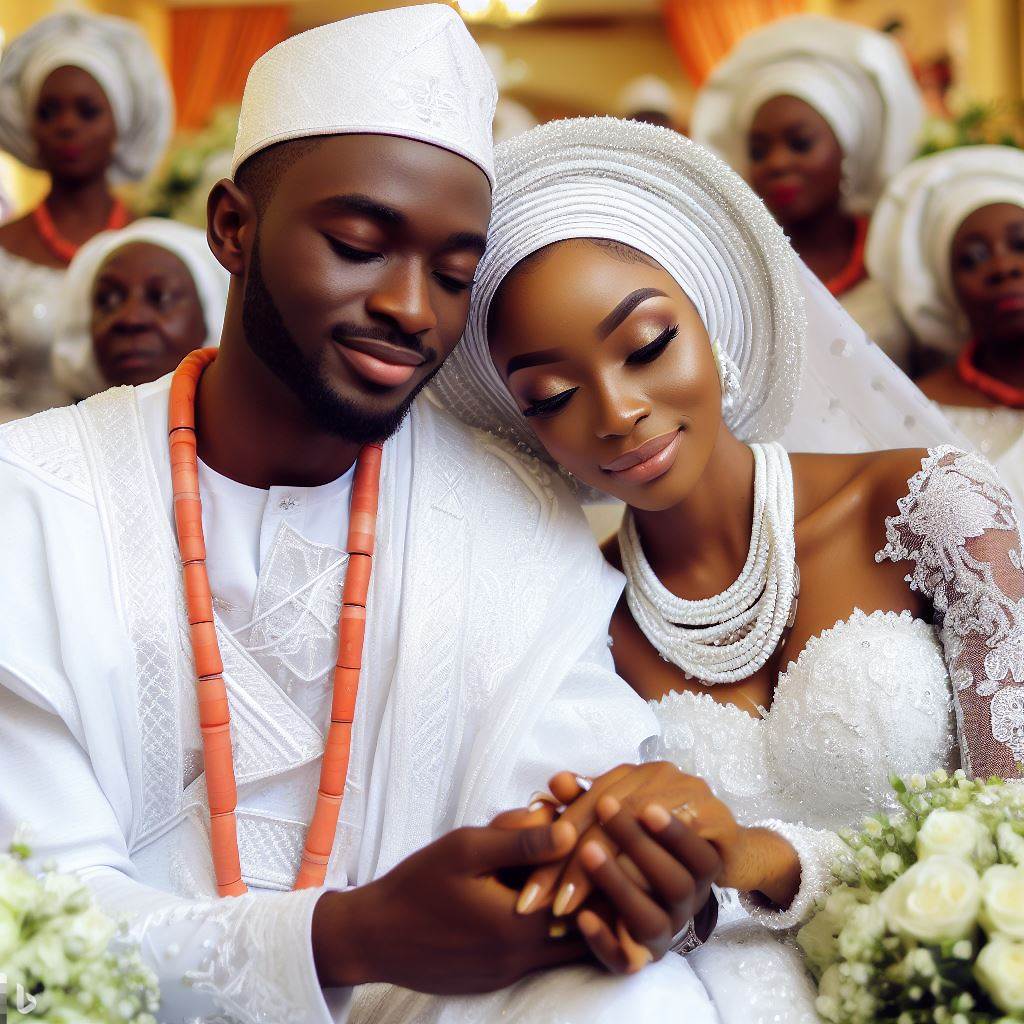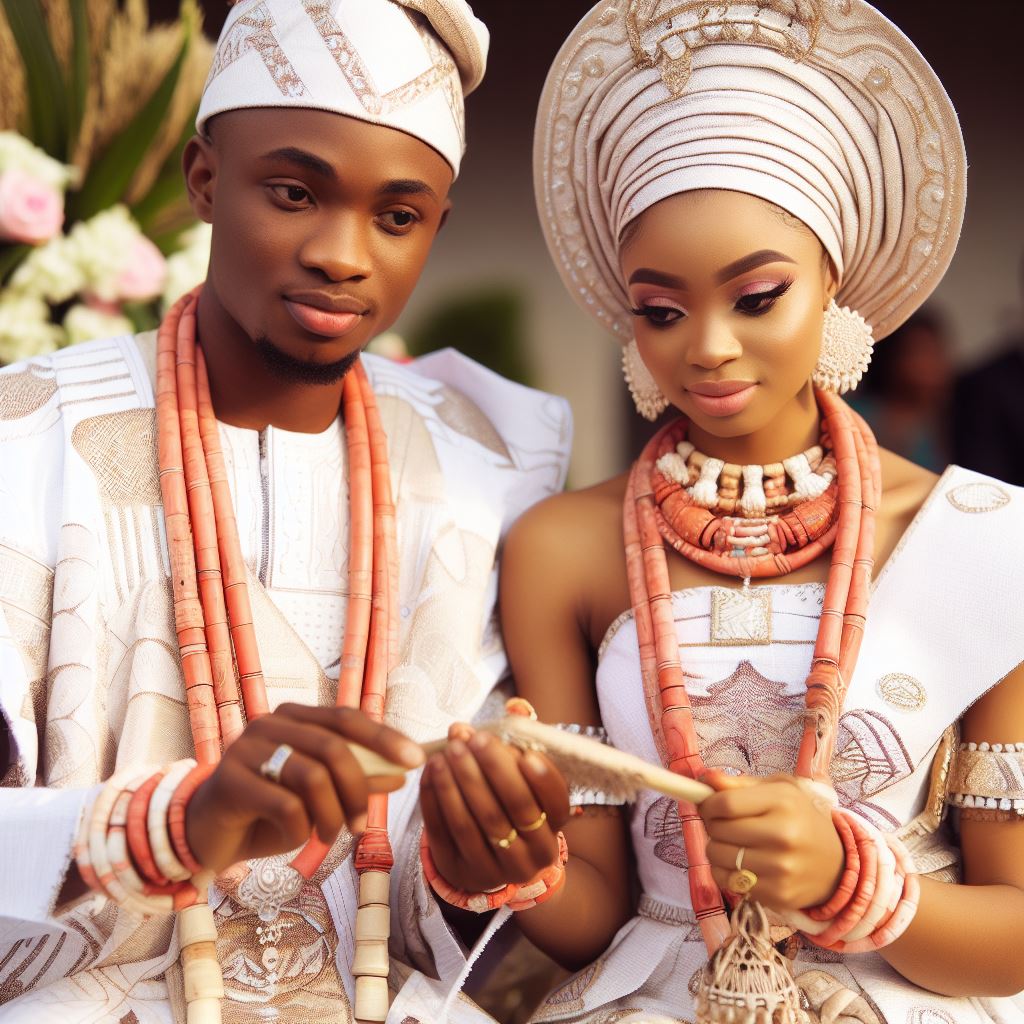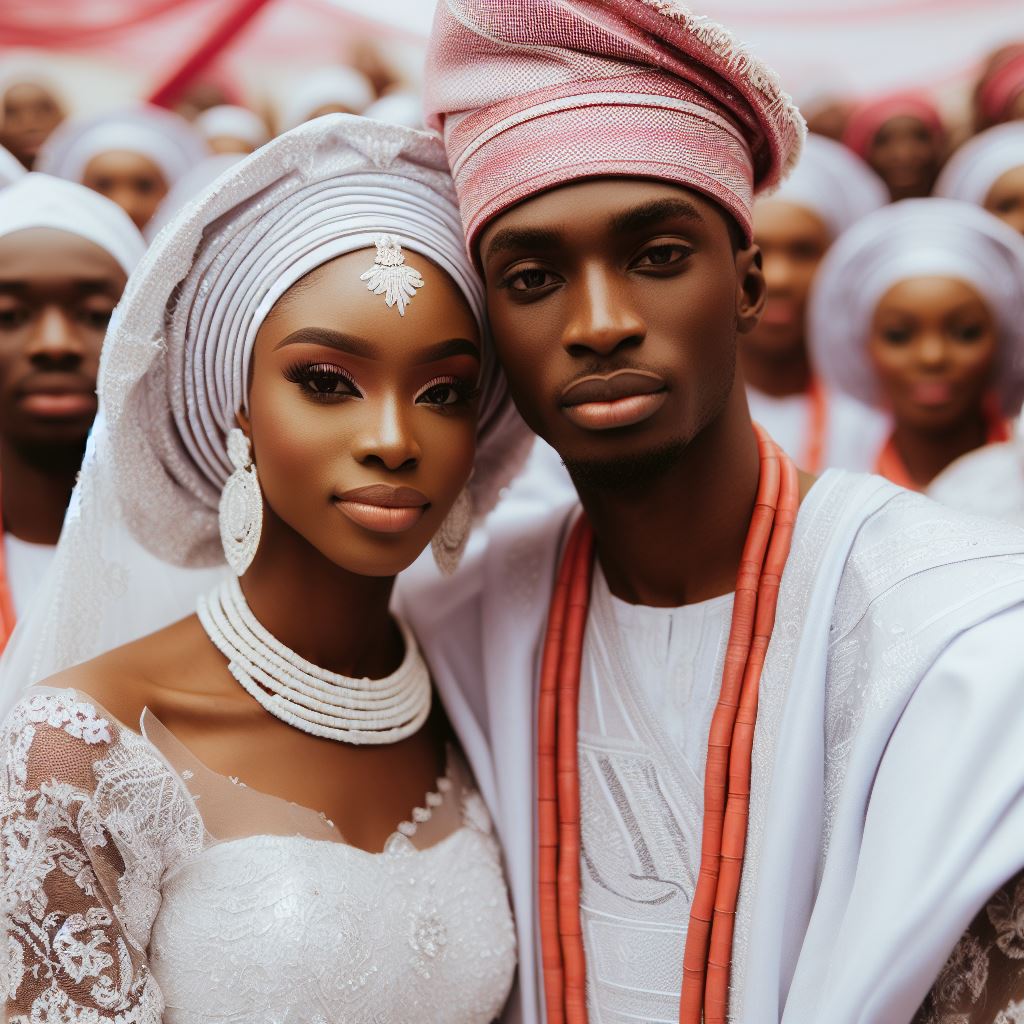Introduction
Traditional marriage rites in Nigeria are the customs and practices followed in marriage ceremonies.
Traditional marriage rites hold significant importance in preserving the Nigerian culture and social cohesion.
Customs and practices deeply rooted in generations have passed down traditional marriage rites in Nigeria.
These rites are an integral part of Nigerian culture and play a vital role in preserving traditions and strengthening societal bonds.
Traditional marriage rites encompass a wide range of rituals and ceremonies that vary across different ethnic groups in Nigeria.
These rites typically involve the exchange of gifts, payment of dowry, traditional ceremonies, and the involvement of family members and community members.
The importance of traditional marriage rites cannot be overstated in Nigerian culture.
These rites serve as a symbol of unity between families, a way to preserve cultural heritage, and a means to ensure the continuity of family traditions and lineage.
In addition, traditional marriage rites foster social cohesion within communities.
They bring together family members, friends, and community members, creating an opportunity for bonding and shared experiences.
These rituals also provide a platform for showcasing cultural values, dress, music, and dance.
Furthermore, traditional marriage rites play a significant role in upholding the moral and social fabric of Nigerian society.
They emphasize the institution of marriage as a sacred union and promote the values of commitment, loyalty, and responsibility.
By adhering to these rites, individuals and families reaffirm their commitment to cultural norms and uphold societal expectations.
Basically, traditional marriage rites in Nigeria are an essential aspect of the Nigerian culture, promoting social cohesion, preserving traditions, and upholding societal values.
These rites serve as a reminder of the importance of cultural heritage and provide a platform for strengthening familial and community bonds.
Pre-Wedding Preparation
Introduction of the potential couple to their families
- The initial step in a Nigerian traditional marriage involves the introduction of the potential couple to their families.
- The couple visits each other’s families with the intention of seeking their blessings and approval.
- Both families meet to get to know each other and assess whether they are a perfect fit.
- This introduction is a significant step in ensuring a successful traditional marriage.
Traditional marriage proposal and acceptance
- Once the potential couple receives blessings from their families, the groom officially proposes to the bride.
- This proposal usually involves the groom and his family visiting the bride’s family to express his intention to marry her.
- The groom’s family presents gifts and a letter expressing their desire for the union.
- If the bride’s family accepts the proposal, they give their consent and blessings to the couple.
Family meetings and negotiations
- After the acceptance of the proposal, both families proceed with multiple meetings and negotiations.
- These meetings aim to discuss various aspects such as dowry, bride price, and other traditional requirements.
- The negotiations are often led by the family elders who negotiate the marriage terms on behalf of their families.
- These discussions can take several weeks or even months to finalize, ensuring all parties are satisfied.
Setting of wedding date
- Once the negotiations are successfully completed, the next step is to set the wedding date.
- This process involves consulting with astrologers, spiritual leaders, or family elders to determine an auspicious day.
- The chosen wedding date is usually based on factors such as astrology, cultural beliefs, and availability of family members.
- Once the date is agreed upon, preparations for the traditional wedding ceremony can begin in earnest.
Pre-wedding preparations are vital in the navigation of traditional marriage rites in Nigeria.
These steps help lay a solid foundation for a successful and culturally meaningful union.
Read: From Courtship to Forever: Nigerian Anniversary Wishes & Stories
Traditional Marriage Rites Process
Introduction of the bride’s family to the groom’s family
In traditional Nigerian marriage ceremonies, the bride’s family is formally introduced to the groom’s family.
The introduction serves as an opportunity for both families to meet and interact with each other.
During the introduction, the bride’s family is welcomed with open arms by the groom’s family.
It is a joyous occasion filled with excitement, laughter, and warmth.
Payment of dowry and bride price
The payment of dowry and bride price is an essential part of traditional marriage rites in Nigeria.
The groom’s family presents gifts, usually in the form of money or goods, to the bride’s family.
These gifts signify the groom’s appreciation for the bride and his commitment to taking care of her.
Negotiations regarding the dowry and bride price are carried out between the families and often involve elders from both sides.
The payment symbolizes the groom’s readiness and willingness to assume responsibility for his bride.
Exchange of gifts between families
To further solidify the bond between the two families, there is an exchange of gifts.
Both families present various gifts such as clothes, food items, and household items to each other.
This gesture showcases mutual respect and fosters goodwill between the families.
The exchange of gifts also symbolizes the willingness of both families to support the union.
Traditional ceremonies and rituals
Traditional ceremonies and rituals play a significant role in Nigerian marriage rites.
1. Introduction of the bride to her ancestors
The bride is introduced to her ancestors through prayers and rituals conducted by a spiritual leader.
This ceremony seeks the blessings of the bride’s ancestors for a prosperous and harmonious marriage.
2. Blessings and prayers for the couple
Prayers are said by both families and the spiritual leader, seeking divine intervention for a happy and successful marriage.
Blessings are bestowed upon the couple, wishing them love, fertility, and longevity.
3. Cultural performances, dances, and songs
Traditional dances and songs are performed to celebrate the union of the couple.
The families, friends, and guests actively participate in the cultural performances, creating a festive atmosphere.
These performances showcase the rich cultural heritage of Nigeria and add vibrancy and excitement to the occasion.
Therefore, traditional marriage rites in Nigeria encompass various customs and rituals.
From the introduction of the bride’s family to the payment of dowry and exchange of gifts, each step holds great significance.
The traditional ceremonies and rituals not only celebrate the union between the couple but also affirm the bond between their families.
Through these rites, Nigerian culture and traditions are upheld and cherished, creating a memorable and meaningful wedding experience.
Read: Nollywood Love: Anniversary Wishes from Famous Film Lines

Participation and Roles of Family Members
When it comes to traditional marriage rites in Nigeria, the involvement of family members is crucial.
Each family has specific responsibilities and obligations that they fulfill during this significant event.
Let’s explore the different roles of family members in more detail.
Role of the bride’s family
The bride’s family holds distinct responsibilities and obligations in the traditional marriage rites.
These duties are rooted in Nigerian customs and ensure a smooth transition for the bride.
Traditional responsibilities and obligations
The bride’s family carries out various rituals and tasks as part of their traditional duties.
They may be responsible for organizing and hosting pre-wedding ceremonies, such as the introduction ceremony where the groom is officially presented to the bride’s family.
Additionally, they are in charge of providing the bride’s dowry, which often includes items like money, gifts, and livestock.
Involvement in wedding planning and organization
Apart from their traditional obligations, the bride’s family actively participates in the planning and organization of the wedding.
They collaborate with the groom’s family to ensure the smooth execution of the event.
From selecting the venue and making arrangements for catering to organizing cultural performances, the bride’s family takes an active role in making the wedding memorable and enjoyable for everyone involved.
Role of the groom’s family
The groom’s family also plays a significant role in traditional Nigerian marriage rites.
They have specific responsibilities and obligations to fulfill in order to support the couple’s union.
Traditional responsibilities and obligations
Similar to the bride’s family, the groom’s family has traditional responsibilities and obligations.
These may include organizing pre-wedding ceremonies from their end, such as providing gifts and performing rituals.
They are also responsible for paying the bride price, which symbolizes the groom’s appreciation and commitment to the bride’s family.
Financial contributions and support
In addition to their traditional duties, the groom’s family provides financial contributions and support throughout the wedding process.
They contribute towards the overall expenses of the wedding, including venue rentals, decorations, and catering services.
These financial contributions help alleviate some of the financial burden on the bride’s family, fostering a sense of unity and cooperation between both families.
Role of extended family and community members
Apart from the immediate families, the extended family and community members hold significant roles in traditional Nigerian marriage rites.
Involvement in ceremonies and rituals
Extended family members and community elders actively participate in various ceremonies and rituals associated with the marriage.
They offer blessings, prayers, and perform traditional rites that symbolize the unity of both families.
Their presence and involvement create a sense of tradition, culture, and community, making the wedding a truly meaningful and memorable occasion.
Support and guidance for the couple
Extended family and community members also provide invaluable support and guidance to the newly married couple.
They offer marital advice, share personal experiences, and advise on building a successful and harmonious marriage.
This support system ensures that the couple begins their married life with a strong foundation, surrounded by the wisdom of their elders.
In summary, the participation and roles of family members in navigating traditional marriage rites in Nigeria are essential.
The bride’s family has specific responsibilities and obligations, actively involving themselves in wedding planning and organization.
Similarly, the groom’s family plays a vital role through their financial contributions and support.
Lastly, extended family and community members contribute to the ceremonies and rituals while providing guidance and support for the couple.
Together, these family members create a sense of unity, culture, and tradition, making Nigerian marriage rites truly special.
Read: The Importance of Affirmation: Daily Marriage Messages
Discover More: Using Nigerian Music Lyrics in Marriage Wishes
Challenges and Considerations for Couples
Balancing traditional expectations with modern values
- Striking a balance between honoring cultural traditions and embracing individual beliefs can be challenging.
- Traditional marriage rites in Nigeria often involve strict customs that may clash with modern principles.
- It is important for couples to openly communicate and find compromises that align with their shared values.
- Respecting and valuing each other’s perspectives can help build a strong foundation for a successful marriage.
- Understanding that compromise does not mean abandoning traditions but rather adapting them to fit one’s values is key.
Financial implications of traditional marriage rites
- Traditional marriage ceremonies in Nigeria can be financially demanding, placing a significant burden on couples.
- The expenses involved in hosting elaborate ceremonies and fulfilling customary obligations can cause financial strain.
- Couples must carefully plan and budget to ensure that the financial obligations of traditional rites do not overwhelm them.
- Discussing financial matters openly and creating a realistic financial plan can help alleviate financial stress.
Negotiating cultural differences within interethnic marriages
- Nigeria’s diverse ethnic groups often lead to interethnic marriages, which come with their own set of challenges.
- Couples in interethnic marriages must navigate cultural differences, traditions, and customs to find common ground.
- Open-mindedness, empathy, and a willingness to learn about each other’s cultures are crucial for harmonious relationships.
- Respecting and appreciating each other’s customs can foster a sense of unity and strengthen the bond between couples.
- Seeking guidance from elders or couples who have successfully navigated interethnic marriages can provide valuable insights.
Addressing gender roles and expectations
- Traditional marriage rites in Nigeria often reinforce gender roles and specific expectations for men and women.
- However, modern couples may have different views on gender equality and roles within a marriage.
- Open and honest discussions about individual expectations can help couples redefine and redefine their roles.
- Recognizing that marriage should be a partnership based on mutual respect and support is crucial.
- Overcoming societal expectations and stereotypes can pave the way for a more fulfilling and egalitarian marriage.
In essence, navigating traditional marriage rites in Nigeria can be a complex task for couples.
From balancing cultural expectations with modern values to managing financial implications and negotiating interethnic differences, couples have numerous challenges to overcome.
However, with open communication, understanding, and a willingness to compromise, couples can create a harmonious and fulfilling marriage that integrates tradition and personal beliefs.
By addressing and addressing gender roles and expectations, couples can ensure that their partnership is founded on equality and respect.
Read: Top 10 Nigerian Traditional Marriage Toast Phrases
Conclusion
Traditional marriage rites in Nigeria hold immense significance for couples.
These rites connect individuals to their cultural roots, promoting unity and a sense of belonging.
Navigating these rites successfully is crucial for a harmonious and fulfilling marriage.
The importance of understanding and respecting these rituals cannot be overstated.
It allows couples to honor their ancestors, maintain family ties, and uphold cherished traditions.
It also fosters a deeper connection with the community, creating a support system that can strengthen the marital bond.
Therefore, it is vital for couples to approach traditional marriage rites with reverence and take the time to learn about their significance.
Furthermore, while modern realities may bring about changes and adaptations, couples should strive to embrace their cultural heritage.
Balancing tradition and modernity can enhance a marriage, allowing couples to blend customs while still honoring their roots.
It promotes a sense of identity and pride, fostering a unique bond between the couple and their shared heritage.
Ultimately, navigating traditional marriage rites in Nigeria is a journey of love, respect, and cultural understanding.
It is an opportunity for couples to deepen their connection, strengthen their foundation, and create a meaningful and enduring union.
By embracing their cultural heritage while adapting to modern realities, couples can forge a path that honors tradition while embracing the future.




